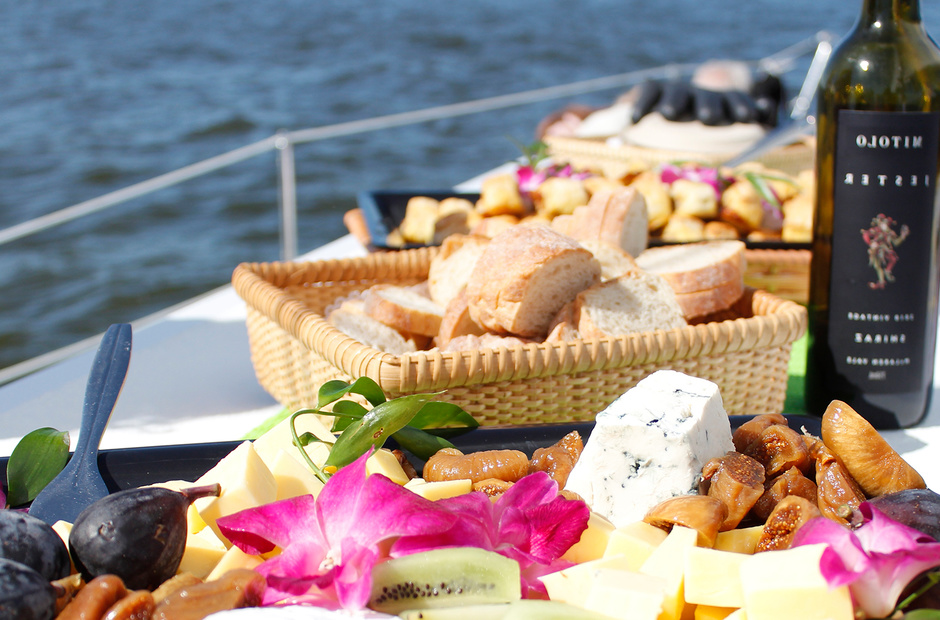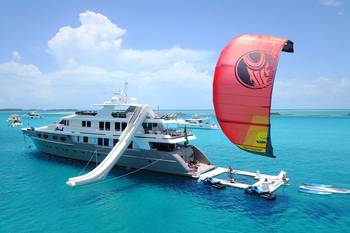«The sea loves the strong, and the strong like to eat» - this simple truth has been repeatedly confirmed by practice. So if your plans do not include renting a boat with a professional chef and hostess from a charter company, then get ready to solve your own eating problems.
Cock to the head.
The matter is considerably facilitated, if in the next campaign there is a well-sintered team, taste preferences of each member of which are well known. If a well-established crew is replenished or the company is going for the first time, it is worth spending at least half an hour to discuss such prosaic problems as eating and drinking on the hike. In this case, it is necessary to determine who will specifically take on the work of buying food according to general wishes, and who will directly engage in cooking. If there is a person in the team who can successfully perform both of these functions, consider yourself lucky!
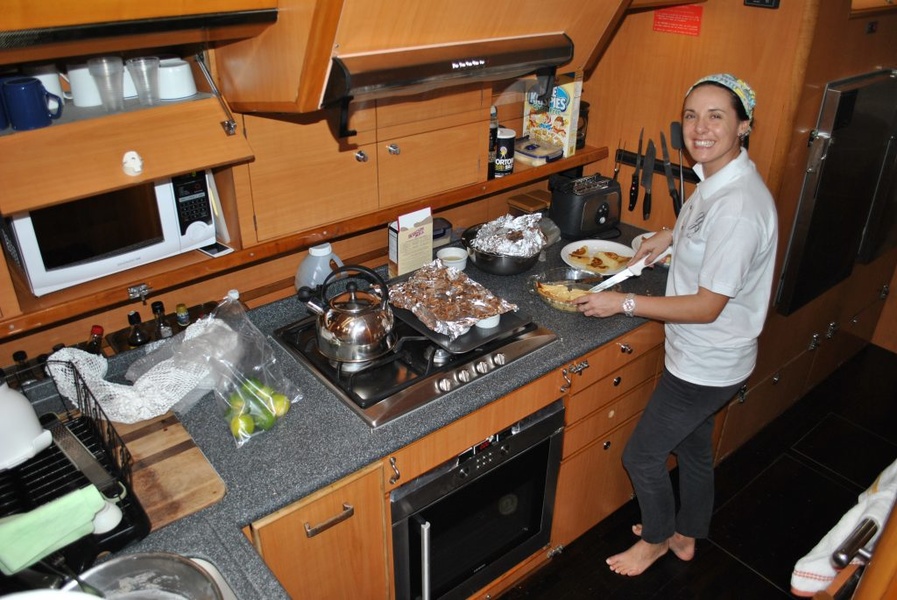
A basic list of necessary products and drinks should be prepared in advance, so as not to waste precious time while eating the boat. Typically, charter companies provide customers with transportation to the nearest supermarket, where you can quickly (and at God's prices) to buy everything you need from the food. In this way there is a chance to significantly speed up the preparation for the boat's departure without losing its quality: while most of the crew inspects and checks the yacht, a freelance foodie-coca along with a voluntary assistant purchases provisions and drinks.
In carrying out this fascinating operation, volunteers should be given sufficient manoeuvrability - both in terms of assortment and budget. All variants of replacement of desirable products and the maximum sum on their purchase it is expedient to discuss in advance, however within the established limits to give to performers full freedom of action. It is worth recalling that the cost of food should be distributed equally among all. Exceptions are possible only in case of an individual order for something specific related to the exotic tastes or health features (diets) of individual crew members.
What is it? What to drink?
Which products are better to stock up on? It depends solely on your tastes and financial possibilities. The main thing is to use the freshest products that you are used to. The latter does not exclude a wide range of familiarity with local cuisine, but the basis of the hike menu should still be made up of dishes that do not risk causing perplexing reaction of your stomachs. Otherwise, let's limit ourselves to the most general recommendations:
Meat
With half a dozen cans of classic stew will never hurt: their contents can be used to make hot dishes quickly (a find for lazy coca) or just furiously eat with a piece of bread in fresh weather - if, of course, the appetite will remain. However, to sit on canned food during the whole vacation seems to be unromantic even for the severe male society, not to mention the possible presence of ladies on board. Therefore, we do not forget about fresh meat, preferably birds.
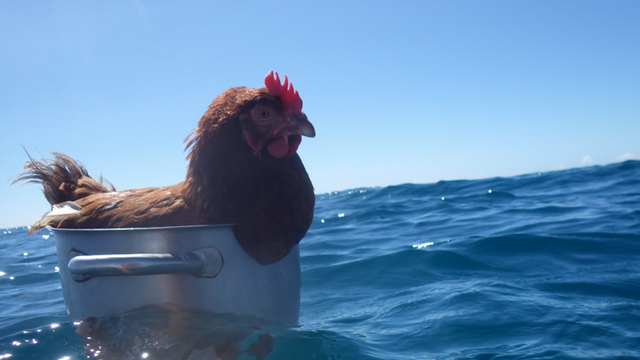
Whole chickens and their individual fragments (including the notorious Bush»«legs) are quite a budget and appetizing source of animal proteins. In addition, they do not require much effort to prepare, and the necessary culinary effect is achieved quickly and with a minimum of additional ingredients. Aesthetes and health fighters can replace chicken with turkey, but hunting for it will usually take more time and money.
By the way, the pork, which most of us are used to, is not very popular in many countries, washed by warm seas. This is due not only to religious reasons, but also to a lack of fresh water necessary for the cultivation of pigs. Even more invigorating water is needed for cattle, so the beef in the southern centres of the world's yachting «bites» even harder than pork at price. So it is wise to satisfy the passion for these types of meat while sailing with dry sausages and/or well-digested ham. Mutton and even goat meat (ah, lamb or goat meat baked in grape leaves!) may be an interesting alternative for lovers of kebabs and roasts, but some previous experience is still required to prepare them. However, when else to try something new, if not on vacation?
Fish
Many yachtsmen I know refer to cooking fish dishes directly on board a boat with a mixed sense and almost no one risks buying ice cream or (let alone) fresh fish and seafood for stock. The only exception is tinned food, which is good for breakfast under the mood, and in difficult weather conditions can serve as a light variant of meat stew. Another matter - fish own catch (if, of course, it can be caught).
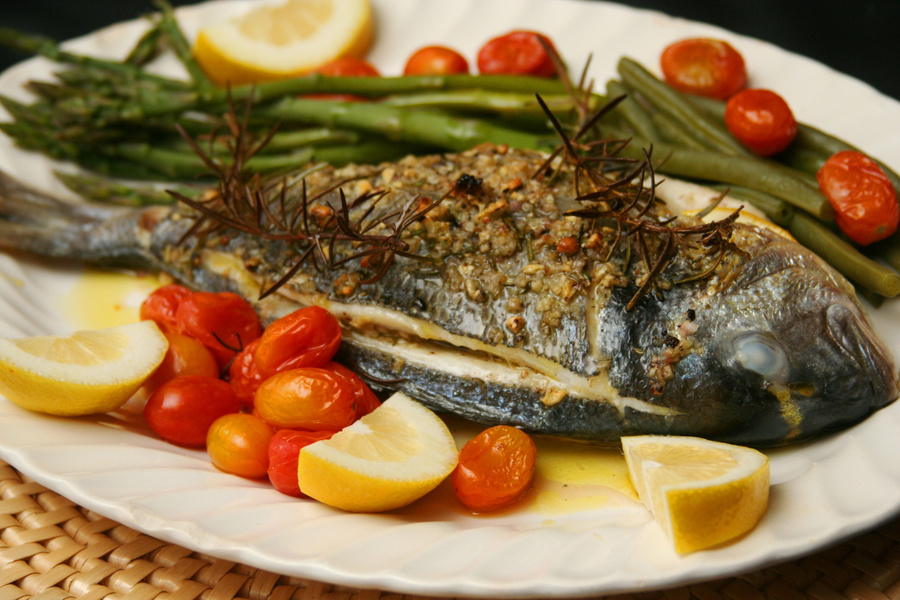
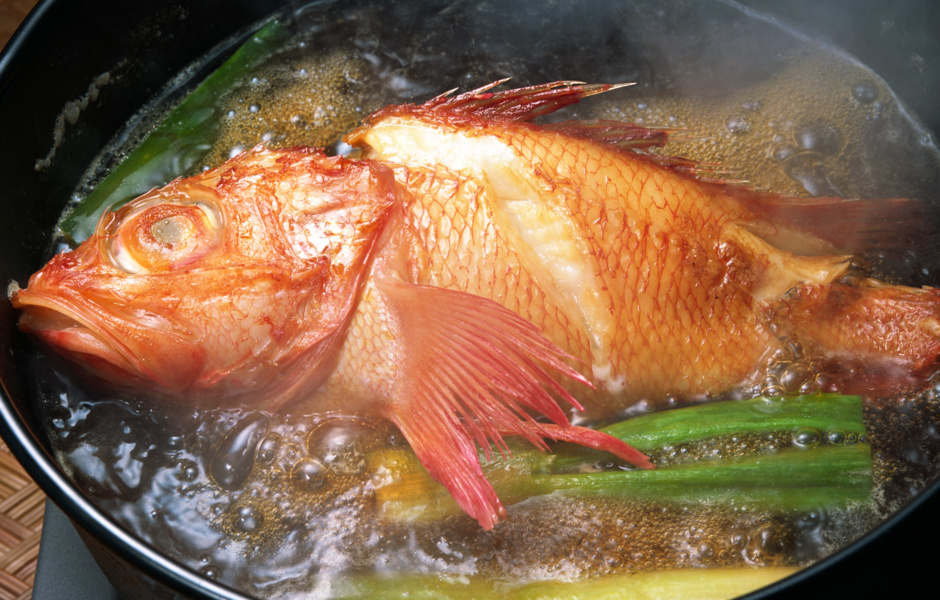
In most cases, it cleans quickly (and gladly), floats for a while in a light marinade and then roasts on the grill in the oven. Other extremely delicious sea creatures, such as squid and octopus, are also worth noting. When properly cooked, they are very appetizing, but require a lot of attention and time, and therefore can only be considered as an original addition to the main menu.
Cereals, pasta and so on.
Simple, nutritious, healthy and inexpensive addition to any main course. It's easy to buy, simple to cook, and can be stored almost forever. Crushed wheat (also known as bulgur), rice, peas (traditional and chickpea), couscous (usual semolina in lint), all kinds of pasta - the list can vary widely depending on the area of travel. These products are especially valuable at the end of the journey, when, as the rest of the stocks are exhausted, you can practice your skills in inventing the most incredible recipes of porridge, kulesh, pilafs and pastas.
Vegetables and fruits
Scurvy even on sailboats is a thing of the past, but natural sources of vitamins should not be forgotten. A gentle set of onions, garlic, carrots, cabbage (all kinds) and all available greenery. This is a ready-made base for the simplest dishes, which can then be turned into real culinary masterpieces by adding local/seasonal ingredients. Grab plenty of juicy fresh ingredients and don't be afraid to experiment: if you are able to cover the cucumber and tomato salad, you can handle the papaya and avocado! Do not deny yourself the pleasure of collecting exotic fruits with your own hands (of course, without violating the sacred property rights). Believe me: lemon, orange or pineapple directly from the branch by the richness of taste and aroma of an order of magnitude superior to their counterparts from the supermarket!
Bread and more.
Our compatriots are traditionally recognized abroad for their increased consumption of bread. There is no need to be shy about it - a timely sandwich perfectly restores strength, safely drives away sleep during the night watch and helps to calm the stomach agitated by swinging. Calculate your consumption correctly and if possible buy fresh bread in even batches throughout the crossing route. Don't forget the breadcrumbs (gallets), which are worth a lot to stock up on at the beginning of your journey - there's no better remedy for seasickness!
Spices and seasonings
As many different as possible! Coriander, turmeric and zira (caraway), as well as various mixtures of dried herbs such as rosemary, tarhuna and basil will be excellent additions to salt and pepper. By the way, if you are going to travel in hot and humid climate, do not forget about curry. This spicy blend not only gives a spicy spicy taste to any dish, but also has preservative properties, preventing its premature deterioration.
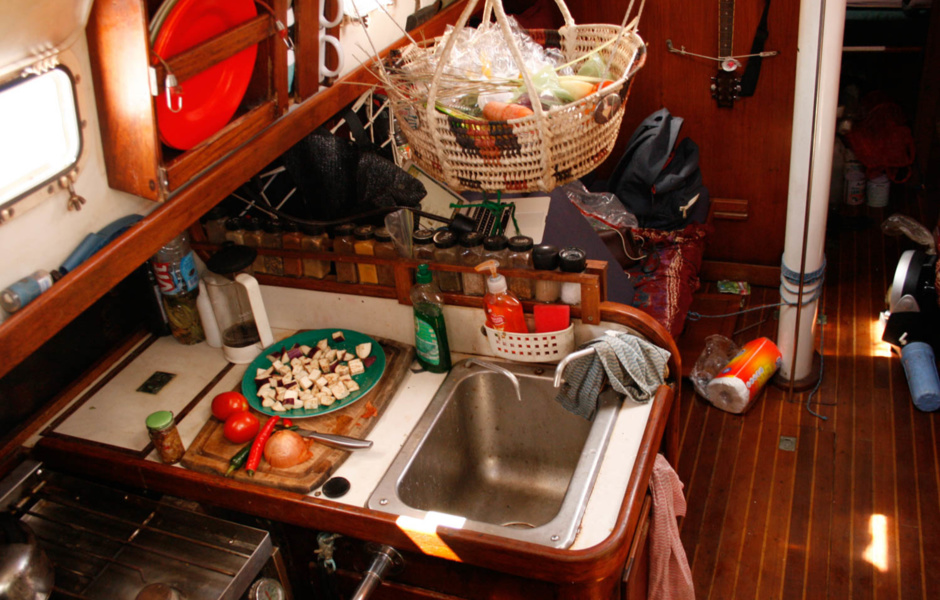
A small container with vinegar (grape or fruit) is also useful as a source of invigorating sourness for marinating meat/fish and salad dressings.
Beverages
First of all - ordinary water, the lack of which in swimming is felt much more acute than on the shore. A miscalculation of drinking water reserves can spoil not only your mood, but also your holiday plans, forcing you to seriously change your initial route or even return to your base prematurely. Therefore, do not hesitate to stock up H2O at least two liters per person per day - there is no extra fresh water in the sea!
Quality coffee and tea are the best choice for hot drinks. As practice shows, this a priori excludes the use of instant coffee and tea in bags, although they have the right to exist as part of the emergency stock. Of course, coffee grinders (let alone coffee machines) may not be available on the boat. But, right, a cup of fragrant natural coffee in the middle of the ocean is worth the hard-working grinding beans still on the shore, and then make a dream drink already on the boat - even in an ordinary pot instead of a Turk.
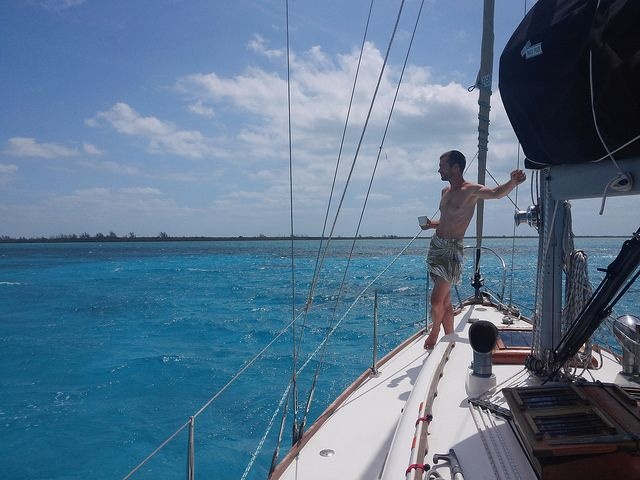
As for hot drinks, special care should be taken with them at sea. As sad statistics show, they are the main «culprits» of many emergency situations, which result not only in broken gear/sails and lost items of equipment, but also in accidents, injuries and even death of yachtsmen. So we are guided by the basic principle: alcohol in unlimited quantities is consumed only in small doses, and we are careful in our choice. So...
Beer at sea is money for the wind, and in the most literal sense. Of course, under the splash of waves on a hot day sometimes nice to freshen up a can of really good beer, but drinks of this level are rarely offered in supermarkets at marinas. Smoothing up the precious space of the boat fridge (and then pouring your own body) with cheap soda potion seems irrational at least. It is much nicer (and with an optimal price/quality/disposal combination) to have a glass or two of dry wine at leisure. By the way, this is a great opportunity to get acquainted with the local varieties, which you will not get at home for any money. The gifts of the vine will help to immerse you deeper into the atmosphere of the country of your stay, which will make your journey truly unforgettable.
Elevated degrees of alcohol. Of course, a couple or three bottles of particularly warm drinks will also do no harm - in case «the boat turns over», but abuse of them in everyday conditions is still not recommended - unless you really want it to happen.
Try not to drown your holiday in a sea of hard drinks!
Vital «little things»
Whichever one of the crew has previously made a preliminary inspection of the galley equipment, once the products have been purchased and delivered to the future coca boat, it is worth checking their possessions in person. In most cases they consist of a compact (two or three burners) gas stove with oven and grill, and a refrigerator. The presence of an electric kettle, microwave, coffee machine and other benefits of modern kitchen civilization on a medium-sized boat seems pleasant, but still a luxury.
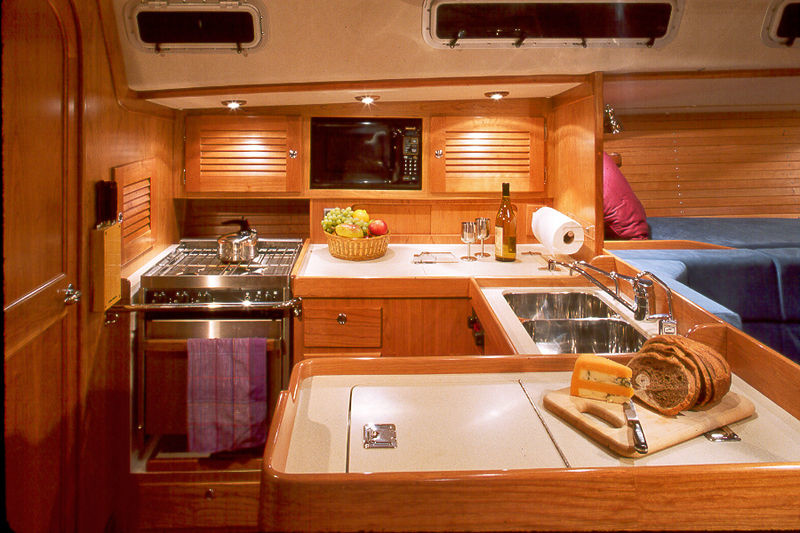
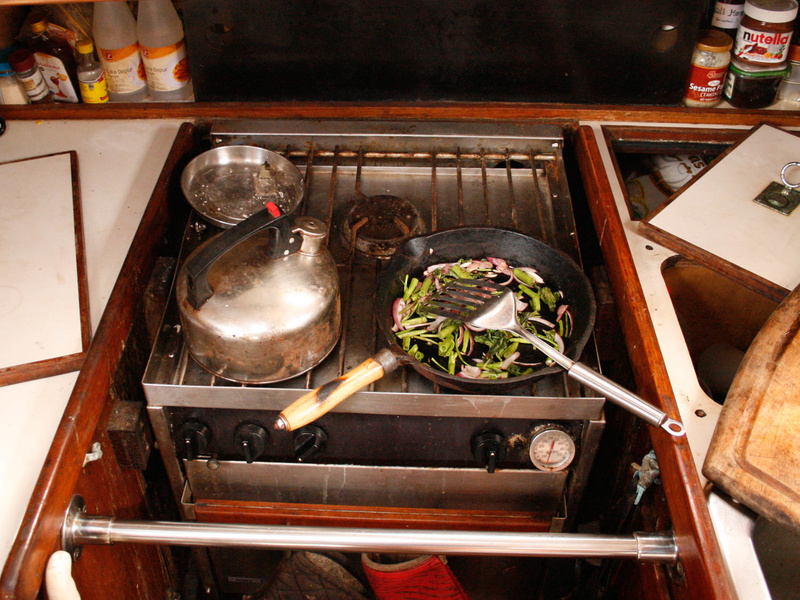
This is particularly felt during long transitions without the possibility of recharging the battery in time. Then you have to save energy for priority needs - for example, to power the navigation device and running lights, for which sometimes you have to turn off even the refrigerator. Sometimes, however, yachtsmen also successfully create power problems for themselves. For example, a cheerful company was in such a hurry to go out to sea that when the power cable was returned it forgot to grab the adapter nozzle.
Inattention had to be traditionally compensated by the cost of effort, time and money: after several unsuccessful attempts to get the adapter at low-civilized points along the crossing route, the necessary device was assembled by craftsmen right on board - from handy and purchased (with great difficulty and for living euros) parts. As bonuses were received: a lot of additional emotions, unforgettable experience and the possibility of uninterrupted use of the fridge in the 30-degree heat.
End of the energy theme: make sure you have the gas cylinders installed and spare - this will avoid unpleasant surprises at sea. By the way, even if the stove is equipped with an electronic ignition system, do not forget to bring a lighter or a couple of boxes of matches. These simple and reliable devices for getting live fire will help you to save a lot of energy and emotions when the piezo element (perfectly acting when receiving the boat) suddenly refuses to go to sea for some reason. Of course, if there are smokers in the crew, there is no shortage of matches/ lighters, but...
A real case comes to mind when four stern men, going on a voyage, firmly decided to quit smoking. All objects reminding of this bad habit were solemnly thrown overboard when they left the marina. As soon as the shore melted in the foggy haze, the stove flatly refused to light up automatically, leaving the heroic crew in the autumn sea without hot food or drink. Having lasted almost three days, the hapless smokers were eventually forced to significantly adjust their route to stock up on matches (and at the same time cigarettes) on the nearest inhabited island.
Cooking at sea: from theory to practice.
In conclusion, we offer three simple recipes for a sea voyage, perfectly proven in real conditions:
Shturmansky salad «»
Any root vegetables (carrots, radish, turnips) should be cleaned, grated or sliced with fine straw. You can add shredded cabbage. Mix and vigorously knead, then sprinkle with salt, pepper and other spices to taste. Sprinkle with vinegar or (even better) lemon juice pulled off the landings, add half a glass of wine (if not sorry), stir well, then leave for at least two or three hours (if enough patience). Serve in the largest bowl you can find on board. Combined with breadcrumbs, it gives an exceptional vivacity during the rocking and increases the ability to recognize navigational guidance in poor visibility.
Goulash «Tears of Coca»
Cut the last bulb and carrot finely and fry it slightly in the largest saucepan on the last drops of any fat. Then fry all remaining fresh meat, sausages and other delicacies in the empty fridge. Pour two thirds of the water, bring to a boil and stew on low heat until the hardest meat fragments are ready, and then fill with a mixture of all the remaining cereals on the boat. Add salt and other spices to taste, boil to readiness and sprinkle with herbs before serving. Serve hot and as fast as possible! As a rule, by the end of a hike this dish becomes a nail of the onboard menu, but it is always popular.
Tea/coffee in Captain's style
Pour strong brewed natural tea or coffee into a large cup. Add sugar to taste, a slice of lemon and two or three tablespoons of cognac, rum or (at the worst) vodka. As you consume, replenish the contents of the cup, trying not to break the original proportions (the bottom of the cup should not shine). The drink has an amazing taste and pronounced tonic properties. It is recommended for keeping forces on night watch at a considerable distance from banks and areas of active navigation.
Think of these recipes at sea, especially if the weather goes bad and stocks run out. We always wish you a pleasant appetite, which means that you only have a good trip under sail!

